A man has been allegedly cast out from his village in Dumka district of Jharkhand by the panchayat for opposing child marriages.
The issue came to light on Thursday when Basharat Ansari, 50, a resident of Chirudih village in Morbhanga panchayat under Mufassil police station area, around 17km from Dumka town, was found by a few local reporters waiting outside the office of the Dumka superintendent of police seeking a meeting.
“I approached the local police station but the SHO (station house officer) said that I should appeal to the deputy commissioner or the superintendent of police. I have made a petition to the SP. I have been raising voice against child marriages in my village for the last few years. I had even stopped the marriage of my niece (elder brother’s daughter) in 2012. I had informed Childline officials who came to the village and stopped the marriage. Now, the panchayat has given an order to expel me from the village. My own brothers have thrown me out of my father’s house,” said Basharat.
Basharat said that after opposition from his brothers and villagers, he had gone to Delhi with his family leaving his father and mother behind in the village.
“My elder daughter went to Old Delhi after marriage. I used to do a carpenter’s job and also had a small grocery shop. I had to leave the village in 2012 after my brother decided to get his minor daughter married. I had only fought for the child and wanted her to complete matriculation at least before marriage. The villagers used to hurl expletives at me for calling Childline members and stopping the marriage of my brother’s daughter. I decided to settle down in Delhi,” said Basharat.
However, in February this year, his elderly parents requested him to come back to Dumka.
“My parents were not keeping well. They requested me to come and stay in Dumka as they needed me as they are not only dependent on the money which I used to send every month from Delhi. I came to Dumka with family (wife and two sons) to stay with my parents in my ancestral house,” said Basharat.
He, however, continued to protest against child marriages.
“As I continued to educate people against the ill effects of early marriage, I became a thorn in the eyes of villagers who were also influenced by my brothers. In August a panchayat was called and I was asked to leave village or give Rs 5 lakh fine for every marriage I oppose. I refused to abide by their directives,” said Basharat.
On August 31, while Basharat was in his house, his elder brother along with a few villagers forcibly threw out his household items from his room and told that he should leave the village according to the panchayat diktat.
“I had no option but to take shelter in my sister’s house in a neighbouring village with my family and parents. However, I sought justice from the police. The SP has assured to initiate a probe into my case. Let’s see,” said Basharat.
Dumka SP Ambar Lakra confirmed that he had received the complaint.
“I have asked the local police station to investigate the issue as I know that Basharat had been doing a good job in stopping child marriages. Action will be taken against anyone found guilty in this case,” said Lakra.
According to data from the United Nations Population Fund, a UN agency aimed at improving reproductive and maternal health worldwide, Jharkhand is among the top three states of India where the practice of child marriage is prevalent. The average number of such cases have never gone below 50 per cent in the past 10 years in Jharkhand as against the national average of 47 per cent, according to the data.











